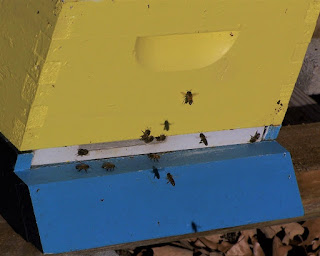Honey bees are typically gentle in nature. Unless a bee is
mashed, as if stepped upon by bare feet, she will not sting. Honey bees do,
however, sting to protect their hive. Beekeepers consider the honey bee’s
behavior as “defensive.” Honey bees are not aggressive in nature. Honey bees do
not attack or seek people to sting. However, any bee colony can be defensive at
times. Defensiveness can result from the bees’ genetics or from environmental
factors. Africanized honey bees are typically more defensive than European races
of bees. Bees may pick up defensive genes from the various drones that virgin
queens mate with when colonies replace their queen through supersedure,
swarming, or emergency queen production.
Environmental conditions can make any colony defensive. Any
time that a hive is under attack, guard bees spread alarm pheromone through the
hive, making the bees considerably more defensive. Hive attacks can come from
large mammals, like bears that destroy the hive, or from small mammals, like
raccoons or skunks. Skunks particularly affect the behavior of the bees because
the nocturnal mammals may attack bee hives for hours on end. Skunks eat bees,
and they scratch at the hive entrance with their claws to entice the guard bees
out of the hive. With a skunk attack, the bee hive is filled with alarm
pheromone, and the bees are highly disturbed. Signs of skunk attacks on bee
hives include hive scratch marks, like on this blue-colored landing board, or
pellets of chewed bee exoskeletons on the ground near bee hives. Another sign that
a skunk is attacking bee hives is an unprovoked sting by a guard bee at a
distance from the hives as soon as one approaches the bee yard. Other attacks
on honey bees can come from humans throwing rocks at bee hives. Often, though,
the greatest threat of attacks upon bee hives comes from other honey bees when
robber bees attack a weak or physically damaged hive to take its honey.
--Richard




